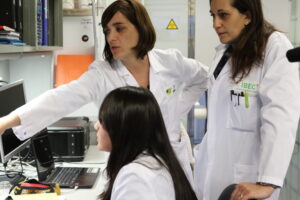Scientists around the world have spent weeks searching for treatments against COVID-19, which has already claimed the lives of hundreds of thousands of people around the world. An example of this is the team of researchers at the Bioengineering Institute of Catalonia led by the ICREA Research Professor Núria Montserrat, to whom the Carlos III Health Institute (ISCIII) has just funded a research project worth more than 300,000 euros to fight against coronavirus.

The resources come from the COVID-19 Fund, a fund that the ISCIII, an agency affiliated to the Ministry of Science and Innovation created on March 19 to finance research projects that aim to improve the management of the coronavirus in the short term.
The cutting-edge research of Professor Núria Montserrat is based on the generation of renal and cardiac organoids – cellular models that simulate the complexity of such organs in the culture dish – from stem cells to identify cellular and molecular responses to the replication of SARS-CoV-2 in these micro-tissues. This approach has recently been effective in studying possible therapies and conducting drug screening.
The objective of the project against COVID-19 led by the IBEC researcher, which they have named “ACE2-ORG” after the cellular receptor (ACE2) that the virus uses to enter cells, is to identify the cellular responses in these ‘mini- organs’ exposed to various clinical manifestations that worsen the prognosis of COVID-19, such as diabetes, in order to specify new therapeutic approaches.
The partners of this project are the Karolinska Institute of Sweden, the Institute of Molecular Biotechnology of the Austrian Academy of Sciences, the Hospital Clinic of Barcelona and the University of Navarra. The researchers will also have acces to cells from the kidney and heart tissue of patients from the Hospital Clínic de Barcelona and thus establish a platform for validating the results found in the organoid models to improve understanding of how organoids interact and infect human cells.
The ISCIII has approved in recent days 37 new research projects involving an investment of almost 3.5 million euros. These are in addition to 85 other studies previously financed by the COVID-19 Fund, which had a total of 24 million euros, of which 90% have already been used in a total of 117 projects.
All these initiatives reinforce the research of the immune response, the biology and behavior of the virus, as well as the stratification of patients according to the prognosis of the disease and the search for possible drugs and new public health solutions to improve the control of the pandemic, among other issues.





